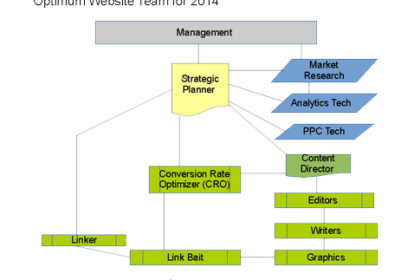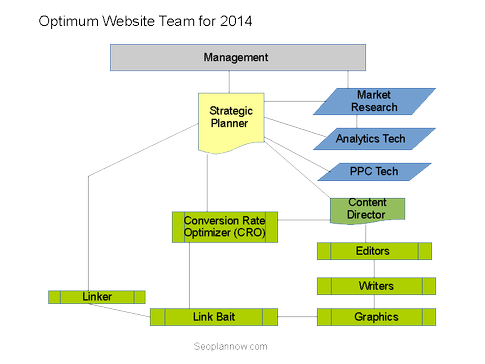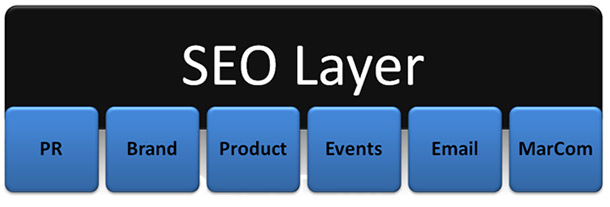
Austin, Texas is still an “SEO Community.”
What do I mean by that? I’ve been in Austin three years now and the amount of time I spend advising startups why their desire to hire an SEO is misplaced, is astonishing. To this day, I’m introduced in social settings here as an SEO, clients refer to me as their SEO, and the topic of ‘how to do SEO’ is a frequent question posed by entrepreneurs. There is still a prevalent belief here that SEO is a distinct thing that you can do which will results in such great success that you might bet your business on it.
I spent 12 years in Silicon Valley and the last time SEO was so prominent was in 2005, when SEO still was such a thing.
Wait… SEO isn’t a thing? Well of course it is but there’s a big difference between thinking of it as a philosophical approach to building and growing businesses with an online presence, and believing that it is a marketing channel with which you can hire a consultant or agency to do SEO for you. As you head into 2104, here’s the one thing you need to know about SEO.
Article Highlights
It’s all about Search Marketing Integration
Years ago, I started to use the analogy of a library in explaining search optimization to business owners and traditional marketers. Simply put, in order to find a book in a library, far more than the keywords on the cover and within the pages, and the popularity of the book, matter. The library has to be open, it has to be intuitively organized, a card catalog or online index needs to point readers to the right section, author information has to be as well cataloged as the title and nature of the book, the book is more likely to be selected if the cover is intact and looks good. I think you get the idea.
As the years passed, the idea held true, and really, point of fact, evolved to apply more broadly, as the emergence of the ideas inherent in “growth hacking” helped validate that how search (which is a channel: Search, which is comprised of paid search placement, for which we do search engine marketing, and organic search results, for which we endeavor to here) performs for a business depends on how it’s considered throughout every level of your business. I’ve referred to this in the past in the context of how search needs to be integrated with the foundation of your business, the functional programs, and the finesse involved in creating a brand, culture, passion, and PR related to you, your business, and your story.
The most significant idea of 2013, the one thing you need to think about when considering SEO, is this; that of “layering,” a term coined by Rand Fishkin, CEO of moz.
The Team Involved in SEO
 Joe Knapp, founder of SEO Plan Now, put together this simple visual representation of the optimal team affiliated with your website. Take a moment to look at it closely, it helps understand the idea behind layering. Joe posits that these are all of the distinct skill sets involved in an effective website.
Joe Knapp, founder of SEO Plan Now, put together this simple visual representation of the optimal team affiliated with your website. Take a moment to look at it closely, it helps understand the idea behind layering. Joe posits that these are all of the distinct skill sets involved in an effective website.
Management (all of them? Yep, look at how broad that box is). Your strategic planners (executives? Business development?). Research and Analytics. PPC (your paid search engine marketing resource). Editorial and content skills (branding, messaging, PR, Sales). Conversion rate optimization (web developers, marketing, customer service, Sales). Link bait (frankly, I hate this term as it implies that you should be gaming Google and people by fishing for links and social validation but the principle behind the idea is this: quality website, good business, great content)… the point being, everyone is involved in the optimal website team. How can any consultant or third party agency DO SEO??
A few of the things that Ruth Burr, Inbound Marketing Lead at Moz, clarified in explaining why Google Analytics has replaced referring keyword data with “(not provided),” is that, “as long as search engines drive traffic to websites, marketers should be thinking about how to get the best audience and the most sales from that traffic. The optimal traffic from search engines, if you will.” She goes on to explain why this is a critical way of thinking in pointing out that increasingly, optimization for search engines means moving AWAY from keywords, building “topical authority” (or as I tend to put it, valid credibility), building your brand, and winning at fundamentals.
Am I painting a picture yet? Where and how you rank as a business is increasingly, and ONLY, a result of doing good business and good marketing. Yes, you can hire (and probably should hire) consultants, and certainly in-house resources, to help you understand how to do that, but it isn’t alone SEO.
So we should be Layering… which is what exactly?
While I’ve characterized this “search marketing integration” as something pervasive throughout your organization, Fishkin suggests, in an Entrepreneur chat with Brad Miller, Director of Business Development at Fathom, ‘rather than looking it as something distinct and isolated from your other business and marketing initiatives, you “need to add SEO as an important review layer on top of all of those other things.”‘

Look at that graphic, is search a part of the discussion in every facet of your business? Forget your next Monday Morning Management Meeting… is your event marketing team considering search in their development of the strategy and plan for the next trade show?? Every layer.
Brad goes on to share that to be successful in search requires collaboration. A favorite topic of mine! To be effective in your business requires focus on interaction, persuasion, organization, and implementation.
- Interaction: Your marketing team has to be interacting with everyone in the organization, including the CFO’s team
- Persuasion: Only with interaction can you identify the right opportunities; opportunities which then require influential persuasion to inspire everyone to work together to achieve your goals. Consider here that capable persuasion often comes from experience and usually requires intelligence (data, validation, etc.). We’re not debating here, we’re marketing.
- Organization: That persuasion is all for naught if your business hasn’t mastered cross-department collaboration. Please don’t tell me you leave your Sales organization in a silo to make cold calls without a CRM, marketing automation, website conversion optimization, consistent messaging, etc. Especially so, don’t tell me that you expect something like Content Marketing too lives in a silo without input from Sales and BD, support from the Customer Service team in promoting the content to customers, related public and media engagement, social marketing, market research, etc. Optimizing for keywords and links is a dead endeavor (or at the very least it’s on its dying breath), your business needs to be working collaboratively to rank well.
- Implementation: Now consider all of the ways in which such work might be implemented: web design, press, site changes, conversion funnel optimization, email marketing, paid search marketing from which you can derive intelligence and maximize your search real estate, market research… we can go on and on, the point should be clear now, SEO is not mere content, meta data optimization, and link building.
It’s Search Engine Optimization, not SEO
To truly understand what your organization needs to be doing, it might be simple enough to merely look at the words that comprise the very idea of SEO. Think about what each of these things embodies and implies.
Search
Search is a big data technology. The world is in love with that trend and term these days so let’s think about what it means. What does it take to pull off what a search technology accomplishes? Massive amounts of data, meta data, tables, trends, and algorithms to parse the data in various ways so it can be digested in countless slices depending on the intent and goal of the user interacting with the engine. Your job as a business is to ensure that data is rich, accessible, accurate, distinct, and valuable. A specific keyword? Certainly not! Unless you intend to try and screw with Google to favor one word that matters to you at the expense of all the others.
Why? It’s “search!” Your business needs to be present for every conceivable, related query. For your business to be successful, customers should find it no matter what, where, or how they are searching. You can’t optimize for a term, you have to optimize for searchers.
Engine
The technology that enables individuals to find you is truly an engine. Four truths about engines: They require 1. components that work together (collaboration) 2. lubrication (quality business, popularity, and traction) 3. maintenance (when your site goes down, pages are deleted, reviews about your business are bad) and 4. they are always running: Unless your business is turned off, the engine is always work, in the real-time of what’s hot right now.
Optimization
Over time, engines fall behind as other innovations replace the efficiency with which they work and the power they produce. From the old steam engine to the warp drive, just as engines fall behind if not optimized, so too does your business. This is the most challenging and pervasive truth that businesses have to embrace. The tools you are using to be efficient and productive today will be replaced by something better tomorrow. The technology on which your site was built yesterday is faster and lighter today. Organizations of today can’t think of A/B or multivariate testing as an opportunity or something to do, but the thing to constantly be doing, throughout landing pages, email newsletters, calls to action, scripts used by Sales, product features, support processes, messaging, and more.
Always be optimizing, not in the sense of picking keywords and endeavoring to rank well but constantly improving every facet of your business because search engines are looking to promote prominently not the site that picks the right terms and has an advantage of being good at getting links or likes, but the best business. And tomorrow, there will be another best if you don’t keep up.
That’s SEO. Where do you start?
Hire advice and experience; here are the questions to ask a search marketing professional. Work from within. The question I’m always asked after I reply that hiring an SEO is a bad idea, is how an organization does it right then when they don’t know how and can’t afford an entire team that does.
If we could overly simplify this idea of layering, we might say that it’s one part technical and one part marketing. There is a reason why one of the most significant human resource discussions of the decade is the changing roles of the CTO, CMO, and CEO. Where once we required developers to build websites, today it’s usually done by marketers. Where once CEOs managed companies, now they are expected to know the entirety of their industry, organization, and business, in real time. Large organizations, economists, and advisors are constantly pointing out that the CEO’s of the future are likely the CMOs of today. Why?
At the heart of layering the philosophies born of SEO throughout your organization, is intelligence and persuasion. Marketing, no?
When you can’t afford that, have a roster of experienced individuals advising your every direction. Don’t figure it out for yourself when countless others have come before you, solved the problems, made the mistakes, and know your industry and business.
Start simply with an audit; therein the SEO consultant of old comes in handy: what’s broken and what can we do better? That audit, simplified as well instead of thinking about it across all layers of the organization, comes in two flavors – technical and marketing.
The technical audit you’re seeking should outline what’s wrong with the site and what needs to be fixed. What type and talent you need in designers and developers to really build, optimize, and run your website properly.
Your marketing audit is just that, in the broadest sense: your web analytics, industry/market research, customer input, site optimization, PR, social marketing, customer service, sales’ processes, marketing automation, etc. ALL of those things affect the success of your business and the impression, therefore, that an engine like Google has of it.
“SEO” isn’t distinct anymore as Google has been trying desperately to level the playing field for businesses by ensuring that one site can’t “out-optimize” another, and rank better, simply because it knows how to play the game. To do that they’ve focused on the fundamentals: good technology (which you want to have audited so you know what you’re doing, why, and how so you don’t screw it up in the future) and good old-fashioned marketing (well, new-fashioned marketing, but hopefully you get my meaning).
Once you know how to do that, start layering it throughout your organization and go back to work being the best.



Really good stuff. This is essentially a blueprint of the type of model I want to establish at my company next year. What advice do you have for those hired as in-house SEOs, as you put it, in a “marketing channel” sense, who are trying to move toward something more holistic? In my case, there is a need and room to grow into something more than an SEO, to orchestrate collaboration and fill in necessary gaps with my own skills (ex: content). What would you call such a person? Online presence coordinator? Search marketer?
Great question Sarah! (and thanks!)
I think the best place to start is by evolving everyone’s understanding of search. With the demise of rank, link building, key word optimization, etc. SEOs are marketers with a specialization in search engines. Being more holistic then starts by blending SEM and organic search and treating search engines as one channel – through which some things you do are paid ads and others are based on content and social marketing.
With an emphasis on “search” it forces the team (really, executives) to then grasp the question: How do you get more people to search for what we do?? We can rank well, we can buy placement to rank well, but at the end of the day, our market share is determined by good old fashioned marketing, creating awareness and increasing search VOLUME for our business.
Once you’ve warped their brains around that, affirm it by pointing out that that IS SEO. Google ranks sites prominently based on popularity (we’re overly simplifying) but popularity is determined by searches for the brand, clicks on the domain (from all searches), social mentions, links, PR… all trending in a positive direction. You can’t rank well any more simply by having the right keywords on a page and a few links to the website: without ongoing interest in the business, which drives more CLICKs (awareness of a business drives a higher click rate) on your results, Google starts to drop you – you aren’t relevant anymore.
You are effectively the search marketer but you’ve established, accurately, that your success is dependent upon increasing awareness, ever improving performance, and interest in the business.
Thanks Paul! The clarity of the explanations and how in-depth you go with it is much appreciated. I think the library analogy says it all and will come in handy. I’m fortunate to have the support I need to move forward on this and hope that I keep getting that type of reception (and I’m optimistic of that). This post will be good to clip as a resource and revisit to ensure from time to time to ensure we’re still on-point. It’s reaffirming to know we’re on the right track. We have all the right resources; just need to make sure in a search context we have a well-oiled machine. Thanks again!
Those people who don’t have any knowledge about SEO this is the best post to read about SEO and its working in nutshell. I wonder to see diagrams and explanation of three terms i.e. search, engine, optimization which sounds pretty good. SEO expert know very well that they need lot of research for any kind of SEO activity. By the way your basics about SEO is good but I think you must mention here on-page optimization too.
[…] as you do your business. Recently, Rand Fishkin, founder of SEO software company Moz, coined the idea of layering in trying to explain this; search should be layered into every aspect of your […]